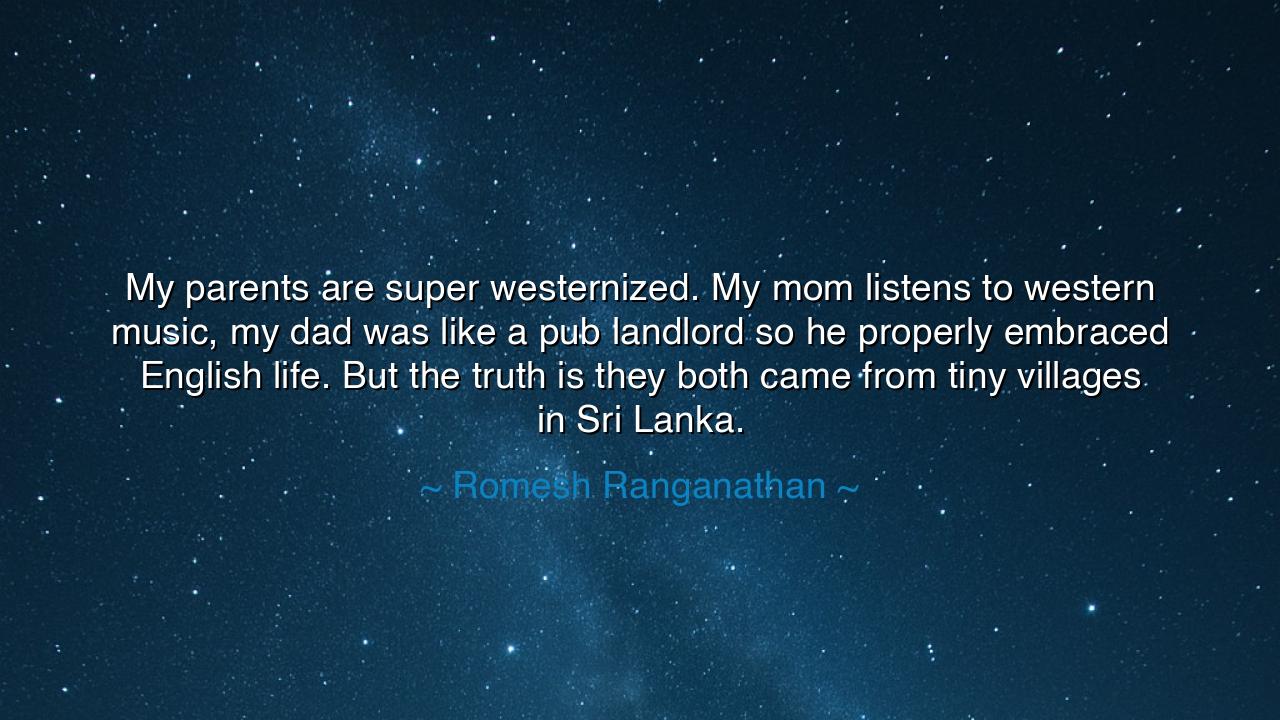
My parents are super westernized. My mom listens to western
My parents are super westernized. My mom listens to western music, my dad was like a pub landlord so he properly embraced English life. But the truth is they both came from tiny villages in Sri Lanka.






When Romesh Ranganathan reflected, “My parents are super westernized. My mom listens to western music, my dad was like a pub landlord so he properly embraced English life. But the truth is they both came from tiny villages in Sri Lanka,” he was not merely describing his family’s history — he was speaking of the ancient dance between roots and adaptation, the eternal tension between where we come from and where we choose to belong. Beneath his humor lies a truth as profound as any told by philosophers: that identity is not fixed like stone, but alive — ever-changing, ever-bridging past and present.
Ranganathan, the British comedian of Sri Lankan descent, was born into a world of hybrid belonging. His parents, shaped by the humble soil of distant villages, crossed oceans to find new lives in England. In doing so, they did what countless generations have done — they shed some garments of the past to clothe themselves in the customs of the present. His mother, who listened to western music, and his father, who poured pints in an English pub, were both witnesses and participants in that grand transformation. Yet even as they embraced their adopted home, the memory of Sri Lanka — its heat, its rhythm, its intimacy — still pulsed quietly beneath the surface.
This is the great paradox of the immigrant soul: to belong to two worlds, yet to be claimed fully by neither. Like the river that changes its course but still flows from the same source, the immigrant carries the past within even as they move forward. When Ranganathan speaks of his parents’ tiny villages, there is no shame, only reverence — for it is from those humble places that their strength and adaptability were born. The simplicity of their origins gave rise to the courage that allowed them to thrive in foreign lands. To leave home is one form of bravery; to build a new one without losing your heart is another.
The ancients would have honored such a journey. Think of Odysseus, who wandered far from Ithaca and lived among foreign peoples, yet never ceased to carry his homeland in his heart. Or of Aeneas, who fled the ashes of Troy to found Rome — a man torn between memory and destiny. Like them, Ranganathan’s parents lived the eternal story of humanity’s movement: from village to city, from one culture to another, from the known to the unknown. Their lives remind us that civilization itself was built by wanderers who learned to marry the familiar with the foreign, who planted the seeds of their old soil in new ground.
And yet, Ranganathan’s reflection also speaks to the complex inheritance of their children. For those born between cultures often feel like translators of identity — not fully one, not fully the other. They inherit both the music of the West and the quiet songs of their ancestors. They may speak one tongue fluently and another with nostalgia. But within that tension lies a gift: the power to see the world with two sets of eyes. To the one who belongs to many worlds, empathy is second nature, and adaptability becomes a sacred art. What the ancestors saw as exile becomes, for their descendants, expansion.
Ranganathan’s words also carry a deeper wisdom about pride and humility. Though his parents adopted the customs of the West, they never ceased to embody the virtues of their roots: hard work, endurance, and gratitude. It is easy, when one moves upward in the world, to forget the soil that nourished the climb. Yet he speaks of their origins not as a limitation, but as a reminder — that greatness often grows from simplicity, and that to remember one’s beginnings is to remain grounded in truth. The pub landlord and the mother who danced to western music were, in spirit, the children of Sri Lanka still — only their stage had changed.
So, my child, let this truth take root within you: to honor your past does not mean to be bound by it. The wise traveler carries his homeland not as a weight, but as a compass. Embrace the new, learn the language of the place you dwell, but never let the echo of your ancestors fade from your heart. You are not divided by your dual heritage; you are enriched by it. The village and the city both live in you, the rhythm of drums and the hum of electric lights both sing in your veins.
And when the world asks who you are, stand firm as Romesh does — with humor, with truth, and with pride — and say: “I am both.” For the story of migration, of blending and belonging, is not merely his or his parents’ story; it is the story of humanity itself — the unending journey of souls seeking home, and finding it wherever courage and memory meet.






AAdministratorAdministrator
Welcome, honored guests. Please leave a comment, we will respond soon